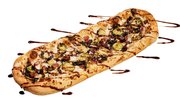Article
Issues outside the kitchen
While you're cooking, the world is brewing with problems. From high gasoline prices to mad cow disease to avian bird flu, there's a lot more impacting your restaurant than menu items. Learn how you can keep these issues from hurting you.

May 14, 2006
From high gasoline prices to mad cow disease to avian bird flu, there's a lot more impacting your restaurant than menu items.
The U.S. Department of Energy is projecting gasoline prices to hover around $3 per gallon this summer. Increased energy costs are squeezing distributors' profit margins, so they're passing those costs along to operators, said A.F. Alhajji, professor of economics and energy at Ohio Northern University.
Camille's Sidewalk Café's contract with U.S. Foodservice states that the restaurant pays a certain percentage of its vendor's fuel, said Steve Greene, Camille's chief operating officer. He believes restaurants can adjust to distributor costs, but the true challenge is keeping customers coming in the door.
"High gas prices affect transaction counts because people have less disposable income," Greene said. "We're all in the same boat and we can't pass it on to the consumer because we can't reduce transaction counts further."
 |
To help its customers absorb high-energy costs, Camille's Sidewalk Café is running an LTO that saves patrons money. |
Camille's has cut back on radio and print advertising and focused on ways to save consumers money. On Tuesdays, stores offer buy-one, get-one-free specials (BOGO Tuesday) for all three dayparts. Greene said some operators don't like the extra food costs from BOGO Tuesday, but "what do you want to do? Do you want to spend more in radio advertising? You have to do what makes sense and customers don't care about how gas prices affect you."
Greene said BOGO Tuesday is the busiest day of the week. "This LTO helps us maintain traffic. Our redemptions on those days are very high," he said.
Today's gas-price situation reminds Greene of when gas first reached $1.50 a gallon in the 1990s. He recalls employees quitting because they couldn't afford to pay for gas and contends today's market situation is just another challenge.
"It still comes down to, do we stand around and wring our hands and speak gloom and doom or do we become proactive and grab market share from competitors busy counting their problems," Green said. "Solutions are found through perseverance."
Trying to find a solution to dipping sales, Mary's Pizza Shack, a 47-year-old, 15-unit family-owned Italian casual restaurant chain, is launching a "top off" promotion that allows guests one free topping for every gas receipt brought into its restaurants.
According to a news release, the promotion is designed to ease the burden of high gas prices, and runs from May 16 to June 4. If more than one topping is ordered, the discount will be applied to the less expensive topping. The offer is good for dine-in, take-out and delivery pizzas.
Preparing for bird flu
The avian bird flu has been confirmed in six European Union countries, including Germany, Italy and Greece. According to the White House, migratory birds will carry it to the United States this year.
In an attempt to get a head start on the possible spread of avian flu, the White House said U.S. scientists are examining birds that migrated to the U.S. from Asia and Europe. Last year, Congress appropriated $23 million to U.S. Department of Agriculture to implement a long-term, domestic avian flu control program. But even if the officials stop it from entering the U.S. food supply, the damage may have already been done to consumer demand.
"With the emphasis of all media shifting from 'if' it will strike to 'when' it will strike, people are fearful and anxious about the imminent threat," said Joydeep Srivastava, marketing professor at the University of Maryland. "They may not process all the information that is available and may succumb to bogus claims of efficacious protection against the avian flu."
According to the National Chicken Council (NCC), all plans are in place to handle the flu if it reaches the United States. But nonetheless, operators should still ensure their products are safe. The NCC suggests the obvious, yet very important:
- Make sure employees wash their hands after handling raw poultry;
- Fully cook all poultry products. Avian influenza is caused by a virus, which is destroyed when poultry is cooked to proper doneness (170F to 180F).
Passing all health board inspections also will go a long way toward helping your customers feel safe eating at your restaurant.
"As an incentive, we give our managers bonuses if they pass all health inspections," Greene said.
Mad cow
In 1997, the Food and Drug Administration (FDA) banned cattle feeds linked with causing mad cow disease or BSE (bovine spongiform encephalopathy). in 2003, the first case of BSE was confirmed in the United States, and in the past year, the USDA confirmed finding another animal with the disease. Neither animal reached the food supply, however, nor did the issue impact consumer confidence in America's beef.
-- Steve Greene Camille's COO |
"Since this bovine didn't make it into the food supply, it's less of an issue for our industry," said Annika Stensson, spokesperson for the National Restaurant Association. "With continued consumer education from the government and other sources, Americans are more understanding of this issue now than they were several years ago, and realize that BSE is not a threat to the U.S. food supply."
In fact, the Cattleman's Association reported that consumers hardly even reacted at all when Canada went through its mad cow scare in 2005.
"We have not seen any anxiety among consumers," said Rick McCardy, director of research for the Cattleman's Association. "There was a heightened media exposure for a couple of weeks and people were waiting to see and looking for reassurance. The media really did their homework and kept their stories based on facts."
Liz Hertz, of Burke Corp., hasn't seen an impact on the beef production side either. Burke purchases Midwestern beef from producers and packers to manufacture fully cooked meat products.
"When mad cow first hit, our clients were asking a lot of questions about the safety of their beef," Hertz said. "But now there are so many barriers in place that people – consumers and operators – believe U.S. beef is safe."
 ChatGPT
ChatGPT Grok
Grok Perplexity
Perplexity Claude
Claude












